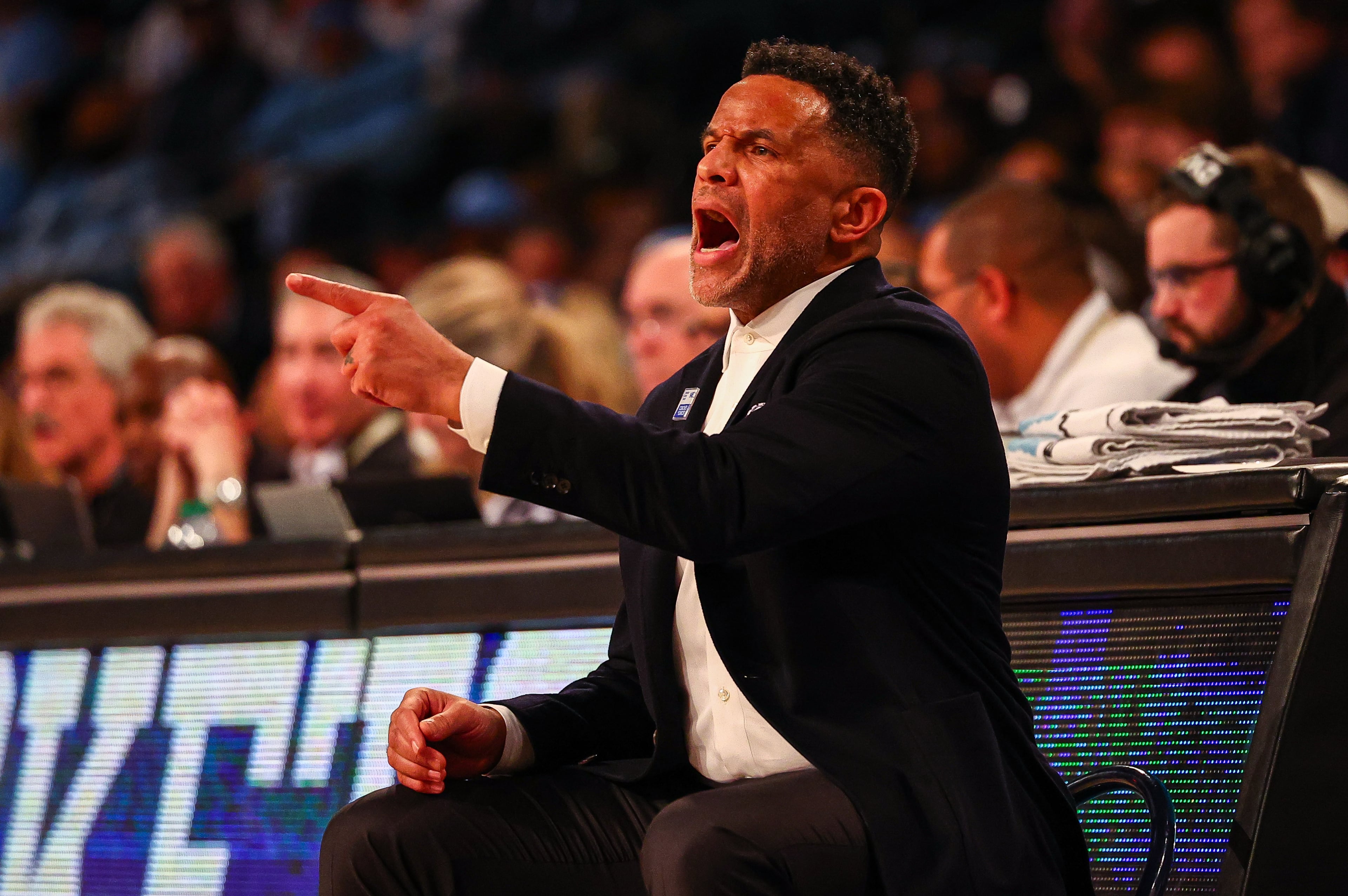The centrality of praise in Geoff Collins’ coaching style
There is plenty of room in Geoff Collins’ world for spirited correction. Toward the end of Monday’s preseason practice, for instance, the Georgia Tech coach yanked a player who used poor technique on a play and banished him to the sideline.
In Tuesday’s practice, periods that didn’t meet his satisfaction were re-started, not a pleasant experience as the Yellow Jackets were in full pads and the sun bore down on Alexander Rose Bowl Field.
However, there’s also a lot of space for players to be patted on the back. That emphasis was on display Monday morning as the Yellow Jackets went through their their fifth day of preseason practice, a day in which the team granted media access to team and staff meetings and practice. Collins’ bent toward positive reinforcement could be heard in a team meeting before practice as he reviewed video of a one-on-one drill in which players lined up and tried to drive the other backward. Even as he corrected, he softened his words with encouragement.
“Cornelius, you’re going to get better, but you’re standing straight up,” he told freshman linebacker Cornelius Evans. “All your power is (generated) when you’re bent. Come off the ball low and strike.”
At the meeting led by Collins – it followed an amusingly profane introduction to the kickoff coverage scheme by cornerbacks coach Jeff Popovich, a presentation that included a clip of a group of cheetahs hunting down an ostrich – much of his 17-minute address was spent doling out praise. Collins highlighted players’ scores recorded on the Catapult system (wearable GPS technology that tracks players’ movement in practice and games) and showed clips of plays from previous practices.
“Chris Martin – give him three,” Collins said, the signal for the team to respond with three quick claps in unison, before he lauded the defensive tackle’s Catapult scores and his huge jump from the spring.
“Young gun Chico Bennett – give him three,” Collins said, reading off his Catapult achievement and then calling the freshman defensive end to the front of the auditorium-style meeting room. There, to the cheers and hoots of teammates, Collins affixed the interlocking “GT” logo deal to Bennett’s previously blank helmet, a badge of honor that freshmen have to earn.
“Justice, you’ve gotten so much better,” Collins said to defensive end Justice Dingle as he played back the one-on-one drill. “Great initial contact and great finish.”
He highlighted scholarship players and walk-ons alike. He interjected during Popovich’s presentation as he showed clips of players sprinting downfield in a kickoff drill – “Is that Devin Smith? Frickin’ beautiful, Devin.” He even pointed out players showing enthusiasm as they watched the one-on-one drill. The praise from the head man has an impact not just on the recipient.
“Sometimes when you’re not on the board, you’re seeing a guy in your position that’s getting his play played out in front of everyone,” defensive end Jaquan Henderson said. “You’re like, I want to be on the board as well the next day.”
With Collins, who it seems does nothing is without a purpose, the carrots – and sticks – are always out there. Losers in various practice drills have to do up-downs, the calisthenic that is the bane of football players everywhere. In Monday’s practice, running-backs coach Tashard Choice was over-the-top excited for running back Jerry Howard when he successfully picked up a blitz in the middle of the pocket. Choice rushed up to Howard after the play was over and screamed “YES! YES! YES!”
Howard had been struggling with that technique, and Choice had worked with him to help him improve, telling him to slow down and not overthink it. Monday represented a breakthrough.
“A lot of people don’t like to block, but I love to block,” Choice said. “So when they do it, I want them to see my excitement for them blocking more than they’ll see my excitement for them running.”
Part of Monday’s practice was a drill called “Thursday Races,” a kickoff simulation in which players basically run downfield as fast as they can after the kick. It’s a quintessential example of how Collins tries to add elements of fun to practice and workouts.
The period is introduced with Kenny Loggins’ “Highway to the Danger Zone” blasted over the speakers in the indoor practice facility. Coaches and players place (pretend) bets on which kickoff unit member will record the top speed.
On Monday, defensive coordinator Andrew Thacker, strength-and-conditioning coach Lewis Caralla and a student assistant wearing a Halloween-costume cat head all raced downfield with the players. As players reached the end zone, the top speeds (in miles per hour) were read out over the speakers.
Players, who love to talk trash about who the fastest player is, get into Thursday Races.
“That’s a very, very important thing,” Henderson said.
At the team meeting before practice, Collins offered his expectation that Catapult records for speed “should be destroyed.” (Slot receiver Ahmarean Brown was up to the challenge, breaking the 23-mph barrier to break his own record.)
Offering praise seems to come naturally to Collins, who said that he learned from one of his grandfathers that, “It’s never a bad time to make somebody feel good about themselves.” But mixed into the levity and kind words, both in Thursday Races and with the team as a whole, is the higher objective to which he continually points the Jackets.
“If we’re playing at 21, 22 miles per hour on the regular, we’re an elite program,” Collins told his team. “Other teams aren’t going to play as hard as us, aren’t going to be trained to play at an elite level like we are.”
It was perhaps a definition of what Collins means when he describes Tech as an “effort-based program.” Should the Jackets reach that point someday, the praise likely will flow most freely.



